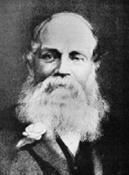William Welch Deloitte

William Welch Deloitte (12 February 1818 – 23 August 1898) was a founder of the professional services firms that subsequently became both Deloitte Touche Tohmatsu and PricewaterhouseCoopers. He was born in London, England. He was one of the fathers of the accountancy profession.
Early life
A grandson of a Count de Loitte, who had fled France during the French Revolution, Deloitte started his career early. At the age of 15 he became an assistant to the Official Assignee at the Bankruptcy Court in the City of London, and there he learned the business. The fledgling accountancy profession grew from its early days in the lucrative business of sorting out the affairs of bankrupts.
Career
At the age of 25, Deloitte opened his own office opposite the Bankruptcy Court in Basinghall Street. Three momentous Companies Acts created joint-stock companies, laying the foundation for modern company structures, and Deloitte was in his element. He made his name with the industry of the day—the railways—and in 1849 at the Great Western Railway, amidst a great commotion; he became the first independent auditor ever appointed. He discovered fraud perpetrated on the Great North Railway by Leopold Redpath,[1] invented a system for railway accounts that protected investors from mismanagement of funds, and was to become the grand old man of the profession. When Deloitte retired from Deloitte, Plender, Griffiths & Co. in 1897, one year before his death, he was the oldest practising accountant.[2]
As president of the newly created Institute of Chartered Accountants, Deloitte found a site for its headquarters in 1888. In 1893, he opened offices in the United States and soon after started to audit a growing soap and candle business. Over a century later, Procter & Gamble is still a client. In 1952, Deloitte's firm in the United States merged with Haskins & Sells.
In 1990, Deloitte Haskins & Sells merged internationally with Touche Ross to form Deloitte & Touche. However, the UK Deloitte firm and some others instead merged with Coopers & Lybrand to form Coopers & Lybrand Deloitte, which subsequently merged with Price Waterhouse to form PricewaterhouseCoopers.[3]
References
- ^ Weiss, Barbara (1986). The hell of the English: bankruptcy and the Victorian novel. London: Associated Universities Press.
- ^ Parker, Robert Henry (1980). British accountants: a biographical sourcebook. Arno Press.
- ^ Deloitte, Touch Merger Done
